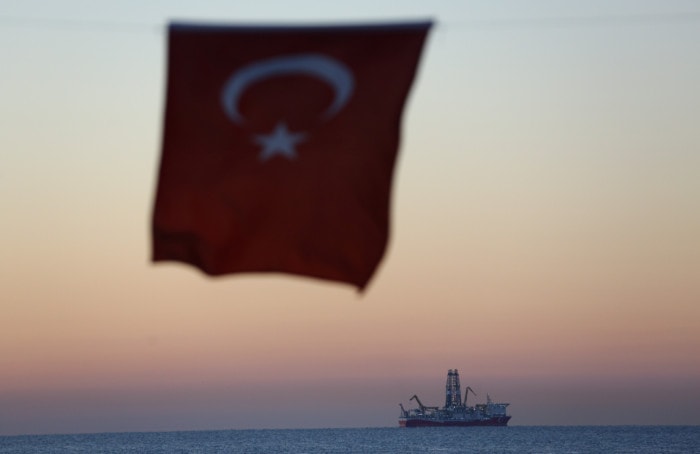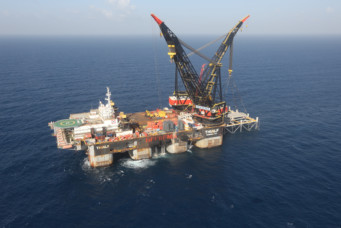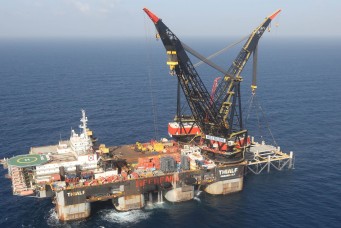Turkey’s Energy Geopolitics
Turkey is at one end of competing geostrategic visions in the Eastern Mediterranean, but are there avenues for reconciliation with countries at the opposite pole?

The Turkish national flag hangs in the foreground as drilling vessel Fatih is seen off the Mediterranean resort city of Antalya, Turkey, Oct. 30, 2018. Reuters/Kaan Soyturk
Since the early 2000s, exploration and discovery of natural gas in the offshore fields of several Eastern Mediterranean countries has contributed to the already complex geopolitics of the region. Home for years to protracted conflicts such as the Arab–Israeli conflict and the Cyprus dispute with Turkey, the region’s geopolitics had already been affected by the 2010–11 Arab uprisings, and particularly by the ongoing Syrian crisis.
It had initially been hoped that the newly discovered hydrocarbon resources and their transportation would foster cooperation among states, but instead they further aggravated the insecurity in the region. Zero-sum geopolitics eventually led to the creation of two poles: Greece, Greek Cypriots, Israel, and Egypt at one end, and Turkey on the other. The level of regional power competition has been augmented by the involvement of the extra-regional powers, mainly the United States and Russia. While Moscow has consolidated its presence in the region through its position in Syria as well as its relations with several riparian states, Washington, the traditional external power in the region, has engaged in an effort to limit Russia’s influence. As a result, the Eastern Mediterranean has become a highly militarized region.
The emergence of Eastern Mediterranean energy politics has spurred Turkey’s further involvement and its recent move to sign a maritime delimitation agreement with Libya to circumvent the other countries. It is important then to explore the motivations behind Turkey’s Eastern Mediterranean policy and the possibilities and limitations of managing geopolitical and geoeconomic competition in the region.
Turkey’s Energy Politics: From Careful Support to Rebuff
Historically, Turkey’s interest in the Eastern Mediterranean was largely limited to the Cyprus problem and its support of the Turkish Cypriots. Thus, when the Greek Cypriots began offshore natural gas explorations around the island and signed maritime delimitation accords with Egypt in 2003 and Lebanon in 2007, Turkey lodged an objection with the UN, citing that the agreements breached Turkey’s and Turkish Cypriots’ rights. These developments were taking place in the first decade of the 2000s while Turkey was undergoing accession negotiations with the European Union, and the UN Secretary-General Kofi Anan’s reunification plan—known as the Annan Plan for Cyprus—was underway. The plan was supported by the Turkish Cypriots and aligned with the Justice and Development (AKP) Party’s “zero problems with neighbors” policy.
In the meantime, Turkey was also involved in pipeline discussions including the Arab Gas Pipeline—which was meant to export Egyptian gas to Jordan, Lebanon, and Syria, with branch underwater and overland pipelines to Israel—with the aim of connecting Turkish gas to the EU countries. Eventually, Iraqi gas was going to link to this pipeline, too. This proposal inspired to create a momentum for interdependence and cooperation between Middle Eastern countries through natural gas as well as provide EU countries an opportunity to diversify their gas supply. Turkey, aspiring to be an energy hub for European markets, satisfy its own growing energy demand, and diversify its energy imports, actively supported this initiative.
Thus, overall in the early 2000s, Eastern Mediterranean natural gas developments remained largely limited and fragmented, and Turkey’s response to the developments was also fragmented. As for Cyprus’s exploration and delimitation agreements, Turkey was wary of these developments and acted reactively in its policy responses rather than take proactive measures to control the situation. In the larger Middle East context, however, natural gas was seen as a commodity that would solidify regional cooperation, a goal and vision that fell in line with Turkey’s Middle East policy at that time and was also supported by the EU.
Eastern Mediterranean natural gas politics, however, began to change from 2010 onwards for two main reasons. First, there was an increase in the exploration and production of natural gas. Discoveries increased in hopes of satisfying domestic demands, which led to a higher projection of imports for the littoral states of the Eastern Mediterranean. The discovery of significant offshore natural gas fields such as Tamar and the Leviathan by Israel in 2009 and 2010 respectively sparked the signing of a maritime delimitation agreement between Israel and the Greek Cypriots in 2010. That year also marked a downturn in Turkish–Israeli relations following the Mavi Marmara incident, in which a Turkish ship that was part of an international flotilla carrying humanitarian aid to the Gaza Strip was raided by Israeli forces, leaving nine Turkish citizens dead.
Second, the geopolitics of the region began to significantly change after the Arab uprisings. Characterized by increasing instability due to multilevel conflicts, increased regional competition, and external intervention, regional politics came to be characterized by fragmentation, securitization, and zero-sum politics. In this context, Turkey’s relations with the region also began to falter as the AKP government made Turkey part of regional conflicts and competition. Turkey was quick to support the uprisings in Egypt and Tunisia, and adopted a policy of regime change in Syria. In supporting the opposition movements, the AKP government particularly cultivated relations with the Muslim Brotherhood in these countries. These positions increasingly put Turkey in conflict with the regional countries which had perceived the post-Arab uprisings developments as a threat and which had favored the status quo.
In the post-Arab uprisings, therefore, Turkey’s relations with all the Middle East countries other than Qatar started to deteriorate.
Despite mounting tensions, however, in the 2010s there were still two more attempts to utilize natural gas as a source of cooperation in the region, namely the 2014 Cyprus talks and the efforts to normalize Turkish–Israeli relations. In both of these cases, the United States was instrumental.
The Cyprus talks started in February 2014, backed by Greece and Turkey, and with U.S. support and involvement. Gas discoveries in 2012 and 2013 proved to be the main impetus behind the start of the new round of negotiations. It was thought that Cyprus’s offshore gas fields could facilitate a peace deal where all the parties could win. Cyprus could export its gas to Europe via a pipeline through Turkey and Greece, and Israeli gas could be linked to this pipeline as well. After all, the Turkish option was seen as the cheapest, quickest, and most secure way to get this gas to European markets. The prospects for a Cyprus settlement further improved following the victory of Mustafa Akıncı in the North Cyprus presidential elections held in April 2015. However, the talks failed in 2017 ultimately due to the parties’ lack of agreement on domestic issues.
Energy issues were also the focus in efforts to restore diplomatic relations between Turkey and Israel. Israeli Prime Minister Benjamin Netanyahu spoke to then-Prime Minister Recep Tayyip Erdoğan in a telephone conversation brokered by Barack Obama, where he apologized about the Mavi Marmara raid and agreed to pay compensation to the families of those killed. The apology was followed by negotiations between the two countries in 2016–17, which aimed to normalize or restore relations between them. In June 2016, Turkey and Israel signed a reconciliation agreement; cooperation on transportation of natural gas became part of the official negotiations. The Israeli foreign minister visited Turkey, the first official visit since 2010, to meet with then-Turkish Energy Minister Berat Albayrak. The most cost-effective route to transport Israeli gas was via Lebanon and Syria to Turkey, but this was not politically viable. The alternative was to pass through the territorial waters of Cyprus. Although for Turkey the pipeline would pass through the Exclusive Economic Zone of the Turkish Cypriot side, for Israel it would mean muddling in the waters of the Cyprus conflict. In any event, the two sides were also unable to agree on economic terms, and as a result no deal was reached.
As this was happening, the Aphrodite gas field was discovered in December 2011. This further solidified cooperation between Cyprus and Israel. In the context of the exportation of natural gas, Greece also became part of the group as they began to develop the idea of an alternative route, the EastMed pipeline, passing through the Greek island of Crete to mainland Greece, which would exclude Turkey.
The relations between the three countries began to expand beyond natural gas cooperation to include diplomatic and military ties. In Ankara, this development was seen as an effort to isolate Turkey. After all, Turkey did have problematic relations with all three of these countries. The historical maritime boundary dispute between Greece and Turkey in the Aegean Sea and the Cyprus problem were linked to the developments in the Eastern Mediterranean. Through their delimitation claims, Cyprus and Greece have sought to control a significant portion of the Eastern Mediterranean, a premise that was not acceptable to Turkey.
Despite some attempts at normalization, Turkey’s relations with Israel were also shaky and have deteriorated largely as a result of the Ankara’s harsh criticism of Israeli policies.
In addition to the EastMed project, another major recent development in regional energy politics was the establishment of the Eastern Mediterranean Gas Forum (EMGF). In January 2019, energy ministers from Italy, Cyprus, Greece, Israel, Egypt, Jordan, and the Palestinian Authority launched the EMGF, which aims to create a regional gas market.
This solidified the links within the EastMed group and especially with Egypt, another important gas producer in the Eastern Mediterranean.
The EMGF seems to be a largely Egyptian initiative as Cairo has ambitions of becoming a regional hub for LNG, which could be a less costly option than the EastMed pipeline, though politically risky. The initiative does not include Lebanon and Turkey; Lebanon does not recognize Israel and has an ongoing maritime boundary dispute with it, while Turkey has problematic relations with most of the EMGF’s members.
Turkey’s Response
All these developments were seen as a threat in Ankara and a violation of Turkey’s and Turkish Cypriot’s sovereign rights and interests. The challenges they posed to Turkey have already been voiced by different actors there, but the AKP government made it an important part of its policy, especially since 2016. The developments in the Eastern Mediterranean were seen not only as an economic matter, but because of the delimitation disputes, they were considered an issue of sovereignty. Thus, the Blue Homeland Strategy—developed by the Turkish military earlier—was adopted to protect Turkish interests which it perceived to be in danger. In that, the government seems to have created domestic political consensus.
This proactive strategy has two elements: first of all, Turkey bought three drilling vessels, to replace the dated Piri Reis, to explore for hydrocarbons in the Eastern Mediterranean. This enabled Turkey to intensify its offshore drilling operations including in disputed zones around the island of Cyprus. In March 2019, Turkey also launched “Blue Homeland 2019,” an extensive naval military exercise that extended across the three seas around Turkey. Turkey’s gunboat diplomacy and President Erdoğan’s declaration that they aim to expand drilling operations in the Mediterranean signaled a possibility of escalation in the region.
Secondly, Turkey signed a maritime delimitation agreement with the Tripoli-based, UN-recognized Government of National Accord (GNA) led by Fayez Al-Sarraj in Libya on November 27, 2019. The agreement, which defined the western maritime delimitation of Turkey, seeks to block the envisaged route of the East-Med pipeline. It also aims to override Greek claims to full maritime rights for its islands, and thus increases not only Turkey’s but also Libya’s continental shelf rights. It also gives more continental shelf rights to Egypt than the agreement Egypt signed in 2003 with Cyprus. This is in line with the argument Turkey has been making for years about the maritime rights of islands constituting “special circumstance” in semi-closed seas like the Mediterranean, where islands may not necessarily have territorial waters based on the median line.
Following the signing of the maritime delimitation agreement, upon the request of the GNA, the Turkish parliament approved the bill allowing the deployment of troops to Libya with 325 votes in favor and 184 against. By signing the maritime delimitation agreement with the Tripoli government, Turkey by and large asserted its commitment to militarily support this government. This has not only redefined the boundaries of the Eastern Mediterranean region but also inserted the regional Middle East competition on the issue of the Libyan conflict into the geopolitics of the Eastern Mediterranean.
In response, Greece expelled the Libyan ambassador to Athens and invited Khalifa Haftar, the military commander trying to topple the GNA, to the capital to meet with Prime Minister Kyriakos Mitsotakis. Similarly, the United Arab Emirates, which has been actively part of the Saudi axis trying to limit Turkey’s influence in the Middle East, has also become involved in the Eastern Mediterranean maritime conflict by supporting the EastMed pipeline. Due to these changes, Eastern Mediterranean geopolitics became linked to Middle Eastern politics and geopolitics, and all these conflicts suddenly became integrated.
What Kind of Interdependence?
In international relations and its subfield international political economy, one dominant view is that economic interdependence softens conflicts and may create peace and stability. With the emergence of the Eastern Mediterranean as a region of natural gas production, many policymakers believed this could create an atmosphere conducive to the resolution of conflicts and problems in the region. As explained above, there were even specific initiatives to that effect.
Unfortunately, the opposite has happened. Today, Eastern Mediterranean geopolitics have become more complex as we have witnessed the linking of separate conflicts and the mounting of potential escalation. Why has this been the case? Of course, there were always scholars who argued that, unlike the liberal view mentioned above, interdependence may exacerbate security concerns rather than eliminate them.
But even if we go along with this view, there seems to be a caveat that does not exist in the Eastern Mediterranean context: to create more peaceful relations, interdependence has to be inclusive.
In the Eastern Mediterranean context, natural gas has created interdependence between Cyprus, Israel, Greece, and Egypt at the exclusion of another important actor, Turkey. Turkey, on its part, has been a part of protracted conflicts with Cyprus and Greece, and has developed a conflictual relationship with Israel and Egypt. Thus, these states have come together not only because of their common natural gas interests but also because of their desire to contain Turkey, a country with which they all have a tumultuous relationship.
In such a case, energy relations not only fail to reduce conflict between states, but in fact exacerbate existing conflictual relations, especially when some of these conflicts are protracted and unrelated to energy like in the case of the Cyprus conflict and the Aegean dispute.
For Turkey, the crux of these conflicts is also no longer only about energy, but rather the fight over maritime delimitation rights, which is linked to its own sovereignty.
This perspective also further securitizes the natural gas issue. Although the competition with Turkey is the main area of contention in the Eastern Mediterranean issue, there are also other ongoing disputes that show that energy interdependencies do not necessarily resolve issues. For instance, although Lebanon has not been very active on this issue until recently, the location of its offshore natural gas overlaps with Israel’s maritime boundaries. Similarly, Israel and Cyprus have a row over the borders of the Greek–Cypriot Aphrodite offshore gas field which borders the Israeli Yishai gas field, with Israel warning the three energy companies involved not to start work on the gas field until the two countries reach an agreement over ownership of the reserves in the border dispute.
Can there be any incentives to turn these disputes around? In the case of mitigating the dispute between Turkey and the current producers, there could be some economic incentives to do so. The natural gas market has been saturated for some time and prices have been dropping. Now with COVID-19 and the anticipation of a world economic crisis, it is safe to expect that the natural gas market will not recover any time soon. In such an environment, it would be more difficult to build the EastMed pipeline, which was itself already an expensive project that faced funding challenges. This may make the option of running the pipeline through Turkey an economically viable one and thus create economic incentives to include Turkey.
But as it has been argued before, economic incentives alone would not be enough to resolve the Eastern Mediterranean quagmire. Political and geostrategic shifts have to happen in order to create common interests that would allow the parties to normalize their relations. One of these shifts has already occurred: by signing a deal with the GNA and doubling up its support for it, Turkey has already raised the stakes for its non-inclusion, although in a risky and dangerous manner. A more diplomatic move could be for Turkey to normalize relations with Israel and/or Egypt. This could pave the way for Turkey’s inclusion in the natural gas politics in the Eastern Mediterranean. Such a development, however, would require the emergence of common geostrategic interests.
It is difficult to find this in the case of Egypt–Turkey relations as Ankara’s moves in neighboring Libya are seen to be against Egyptian interests. In spite of that, any thaw in bilateral relations would not only help to ease tensions in the Eastern Mediterranean but also help to stabilize Libya. In the case of Israel, however, there may be a convergence of interests in Syria in terms of limiting Iran’s influence in the country. Interestingly, there have been recent references in both Turkish and Israeli media to improving relations between the two countries, especially around energy issues, mainly promoting Turkey as a destination as well as a gateway to Israeli gas. Moreover, the recent decision of Israeli airline El Al to resume cargo flights to Turkey after a ten-year pause was interpreted by many as a sign of changing relations. However, it is very early to tell how things will turn out as the Netanyahu government’s plans to annex parts of the West Bank this summer can easily disrupt any moves toward normalization. For now, the maximalist and zero-sum positions taken by all actors involved are not contributing to the stability of the region and as such constitute a challenge to reaping the benefits of the newly found resources.
Meliha Benli Altunışık is a professor at the department of International Relations, Middle East Technical University, Ankara. She is a non-resident scholar in the Middle East Institute and co-author of Turkey: Challenges of Continuity and Change and has published in journals on Turkey’s foreign policy in the Middle East.
Read More



